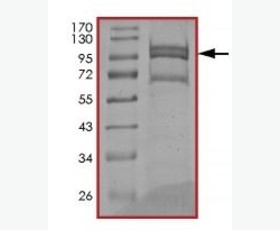Recombinant Human Alpha-Fetoprotein/AFP
| Product name: | Recombinant Human Alpha-Fetoprotein/AFP |
| Source: | Human Cells |
| Purity: | Greater than 95% as determined by reducing SDS-PAGE. |
| Buffer Formulation: | Lyophilized from a 0.2 μm filtered solution of PBS, pH7.4. |
| Applications: | Applications:SDS-PAGE; WB; ELISA; IP. |
| Storage: | Avoid repeated freeze/thaw cycles. Store at 2-8 oC for one month. Aliquot and store at -80 oC for 12 months. |
| UOM: | 100ug/50ug/200ug/1mg/1g |
| Source | Human Cells |
| Description | Recombinant Human Alpha-fetoprotein is produced by our Mammalian expression system and the target gene encoding Arg19-Val609 is expressed with a 6His tag at the C-terminus. |
| Names | Alpha-fetoprotein; Alpha-1-fetoprotein; Alpha-fetoglobulin; AFP; HPAFP |
| Accession # | P02771 |
| Formulation | Lyophilized from a 0.2 μm filtered solution of PBS, pH7.4. |
| Shipping |
The product is shipped at ambient temperature. |
| Reconstitution |
Always centrifuge tubes before opening. Do not mix by vortex or pipetting. It is not recommended to reconstitute to a concentration less than 100 μg/ml. Dissolve the lyophilized protein in ddH2O. Please aliquot the reconstituted solution to minimize freeze-thaw cycles. |
| Storage |
Lyophilized protein should be stored at < -20°C, though stable at room temperature for 3 weeks. Reconstituted protein solution can be stored at 4-7°C for 2-7 days. Aliquots of reconstituted samples are stable at < -20°C for 3 months. |
| Purity |
Greater than 95% as determined by reducing SDS-PAGE. |
| Endotoxin | Less than 0.1 ng/µg (1 IEU/µg) as determined by LAL test. |
| Amino Acid Sequence |
RTLHRNEYGIASILDSYQCTAEISLADLATIFFAQFVQEATYKEVSKMVKDALTAIEKPTGDEQS SGCLENQLPAFLEELCHEKEILEKYGHSDCCSQSEEGRHNCFLAHKKPTPASIPLFQVPEPVTSC EAYEEDRETFMNKFIYEIARRHPFLYAPTILLWAARYDKIIPSCCKAENAVECFQTKAATVTKEL RESSLLNQHACAVMKNFGTRTFQAITVTKLSQKFTKVNFTEIQKLVLDVAHVHEHCCRGDVLDCL QDGEKIMSYICSQQDTLSNKITECCKLTTLERGQCIIHAENDEKPEGLSPNLNRFLGDRDFNQFS SGEKNIFLASFVHEYSRRHPQLAVSVILRVAKGYQELLEKCFQTENPLECQDKGEEELQKYIQES QALAKRSCGLFQKLGEYYLQNAFLVAYTKKAPQLTSSELMAITRKMAATAATCCQLSEDKLLACG EGAADIIIGHLCIRHEMTPVNPGVGQCCTSSYANRRPCFSSLVVDETYVPPAFSDDKFIFHKDLC QAQGVALQTMKQEFLINLVKQKPQITEEQLEAVIADFSGLLEKCCQGQEQEVCFAEEGQKLISKT RAALGVHHHHHH
|
| Background | Alpha-fetoprotein (AFP) is classified as a member of the albuminoid gene superfamily consisting of albumin, AFP, vitaminD (Gc) protein, and alpha-albumin. AFP is a glycoprotein of 591 amino acids and a carbohydrate moiety. AFP is a major plasma protein produced by the yolk sac and the liver during fetal development. It is thought to be the fetal form of serum albumin. AFP binds to copper, nickel, fatty acids and bilirubin and is found in monomeric, dimeric and trimeric forms. AFP is one of the several embryo-specific proteins and is adominant serum protein as early in human embryonic life as one month, when albumin and transferrin are present in relatively small amounts. It is first synthesized in the human by the yolk sac and liver (1-2 months) and subsequently predominantly in the liver. A small amount of AFP is produced by the GI tract of the human conceptus. It has been proved that AFP may reappear in the serum in elevated amounts in adult life in association with normal restorative processes and with malignnt growth. Alpha-fetoprotein (AFP) is a specific marker for hepatocellular carcinoma (HCC), teratoblastomas, and neural tube defect (NTD). |














